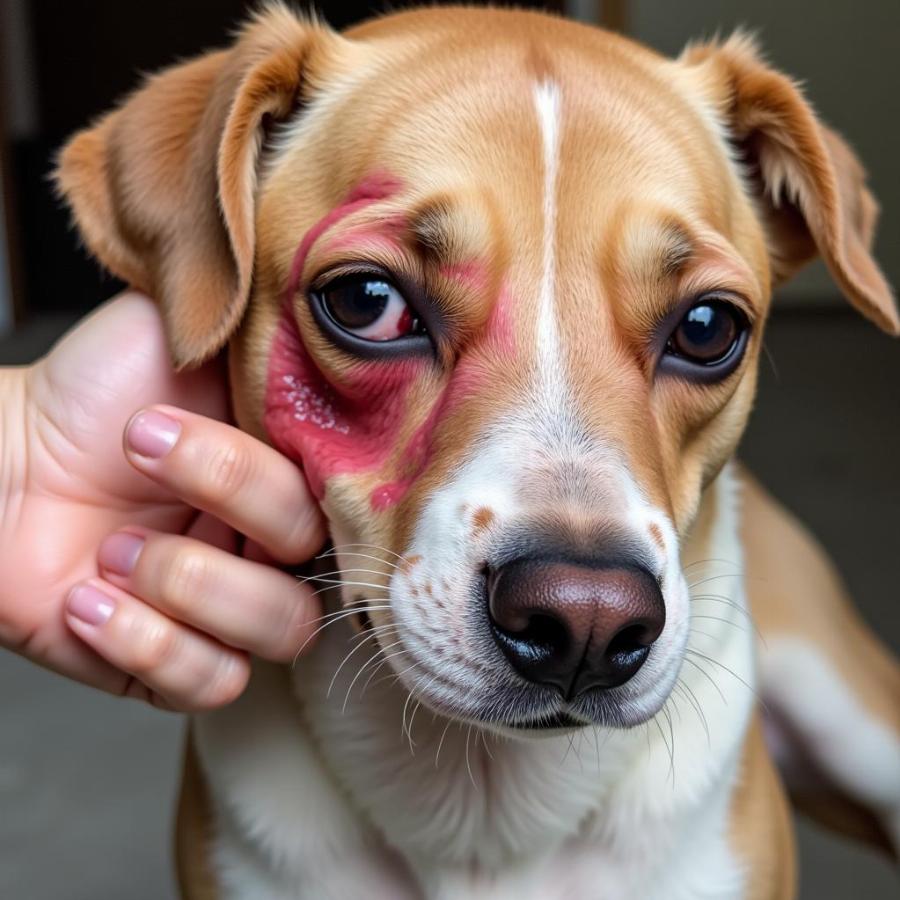Dealing with a goopy-eyed pup? It’s heartbreaking to see your furry friend uncomfortable, and many pet parents wonder how to treat dog eye infection without a vet visit. While some home remedies can provide temporary relief, it’s crucial to understand when professional help is essential. This article will guide you through safe at-home options and red flags that signal a trip to the veterinarian.
Understanding Dog Eye Infections
Just like humans, dogs can experience various eye issues, ranging from mild irritations to severe infections. Common causes include:
- Conjunctivitis: Inflammation of the conjunctiva, the membrane lining the eyelid.
- Allergies: Just like us, dogs can be allergic to pollen, dust, mold, and even certain foods.
- Foreign objects: Anything from dirt to grass seeds can easily irritate a dog’s eye.
- Scratches or injuries: Rough play or accidental bumps can lead to corneal abrasions.
 Dog showing symptoms of eye infection
Dog showing symptoms of eye infection
Home Remedies for Dog Eye Infections
While these remedies can offer temporary relief, it’s crucial to consult your vet for proper diagnosis and treatment, especially if symptoms worsen or persist.
- Saline Rinse: A simple saline solution can help flush out debris and soothe irritation. You can find sterile saline eye drops formulated for dogs at most pet stores.
- Warm Compress: A clean, warm compress can help reduce swelling and discomfort. Soak a soft cloth in warm water, wring it out, and gently hold it against your dog’s eye for a few minutes.
- Chamomile Tea: Chamomile possesses natural soothing properties. Steep a tea bag in warm water, let it cool completely, and use it as a gentle eye wash.
When to Seek Veterinary Care for Your Dog’s Eye
Home remedies are not a substitute for professional veterinary care. If you notice any of the following symptoms, contact your vet immediately:
- Yellow or green discharge: This could indicate a bacterial infection that requires antibiotics.
- Bloodshot eyes: While some redness is normal with irritation, excessive bloodshot eyes can signal a more serious problem.
- Cloudiness in the eye: This could indicate corneal damage or other serious issues.
- Excessive squinting or pawing at the eye: These are signs of pain and discomfort, and your dog needs to be examined by a vet.
- Swollen eyelids or surrounding area: Significant swelling could point to an allergic reaction or infection.
Preventing Dog Eye Infections
Prevention is always better than cure! Here are some ways to keep your dog’s eyes healthy:
- Regular Grooming: Keep the hair around your dog’s eyes trimmed to prevent it from poking and irritating the eyes.
- Careful Cleaning: Use a damp cloth or pet-safe wipes to gently clean any discharge around your dog’s eyes. dog eye discharge home remedy
- Safe Play: Supervise your dog during playtime, especially with other dogs, to minimize the risk of eye injuries.
- Regular Vet Checkups: Just like annual physicals are crucial for humans, regular veterinary checkups can help detect and address potential eye problems early on.
The Risks of Self-Treating Dog Eye Infections
It’s tempting to rely on home remedies or otc eye drops for dogs to save time and money. However, delaying professional care can lead to several risks:
- Worsening the infection: Some home remedies may not address the underlying cause of the infection and could even exacerbate it.
- Delaying necessary treatment: Early intervention is key to preventing complications and ensuring a full recovery.
- Incorrect diagnosis and treatment: Eye issues can be complex, and without proper veterinary diagnosis, you risk misdiagnosing and mistreating the condition.
- Potential for eye damage: Using the wrong products or methods can potentially damage your dog’s delicate eye tissues.
FAQs About Dog Eye Infections
Q: Can I use human eye drops on my dog?
A: Absolutely not! Human eye drops are formulated for our eyes and can be harmful or even toxic to dogs. Never use any medication on your dog without first consulting your vet.
Q: Are all dogs eye infection contagious?
A: Some eye infections, like conjunctivitis, can be contagious to other dogs. It’s always best to keep your dog isolated from other animals if you suspect an eye infection.
Q: My dog has watery eyes but no other symptoms. Should I be worried?
A: Watery eyes can be normal for some breeds, but it’s always a good idea to have your vet check it out, especially if it’s a new symptom. It could be a sign of allergies, a blocked tear duct, or other issues.
Conclusion
We all want our furry friends to be happy and healthy. While some home remedies can temporarily soothe your dog’s eye irritation, it’s vital to remember that they are not a substitute for professional veterinary care. If your dog exhibits any signs of an eye infection, don’t hesitate to contact your vet. Early diagnosis and treatment are crucial to prevent complications and ensure your dog’s swift recovery.
Remember, your dog’s eye health is in your hands!
Got More Questions About Dog Health?
Beaut Dogs is your go-to resource for all things dog-related! We provide reliable and in-depth information on dog breeds, care, and well-being.
For tailored advice or further assistance regarding your dog’s eye health, don’t hesitate to reach out to our team of experts at [email protected]. Let Beaut Dogs be your trusted companion on your journey of responsible dog ownership!